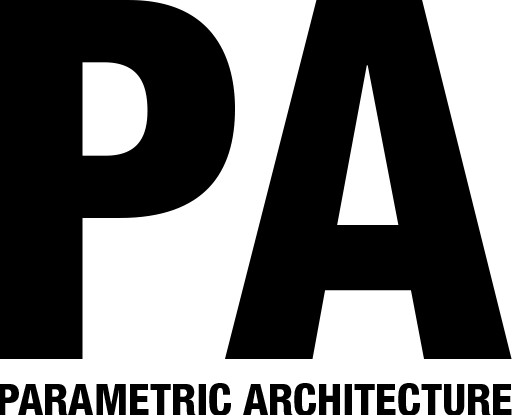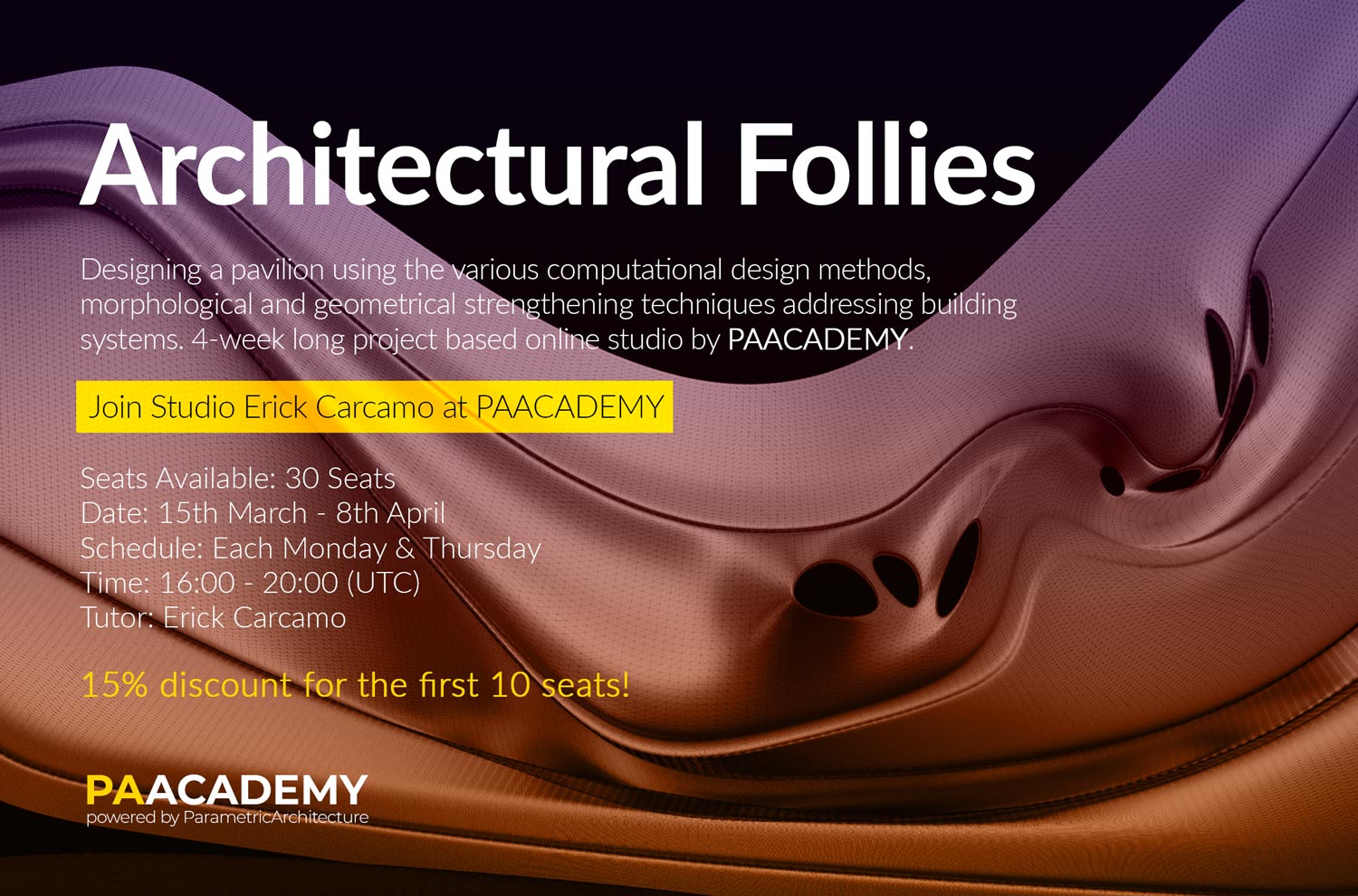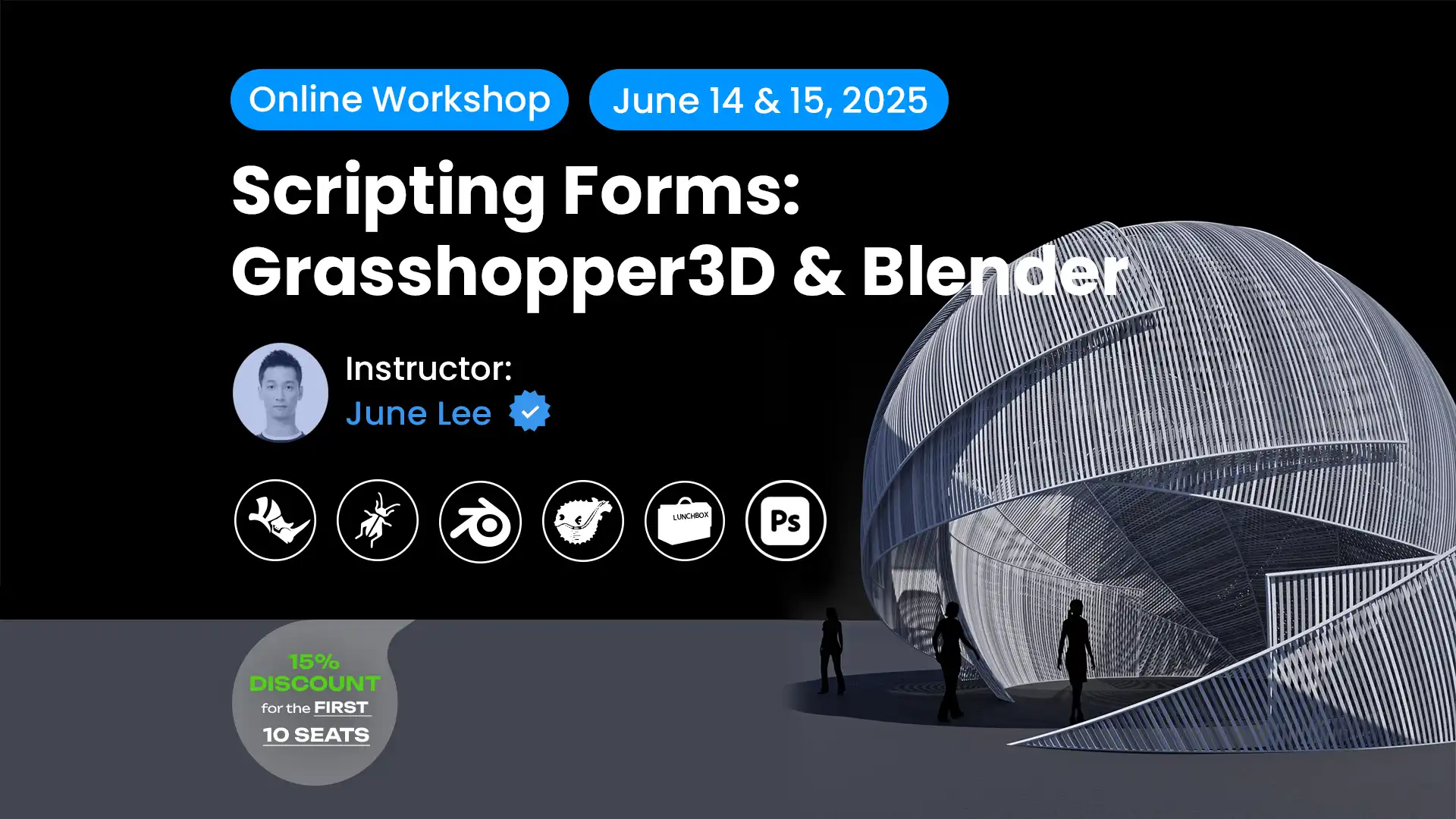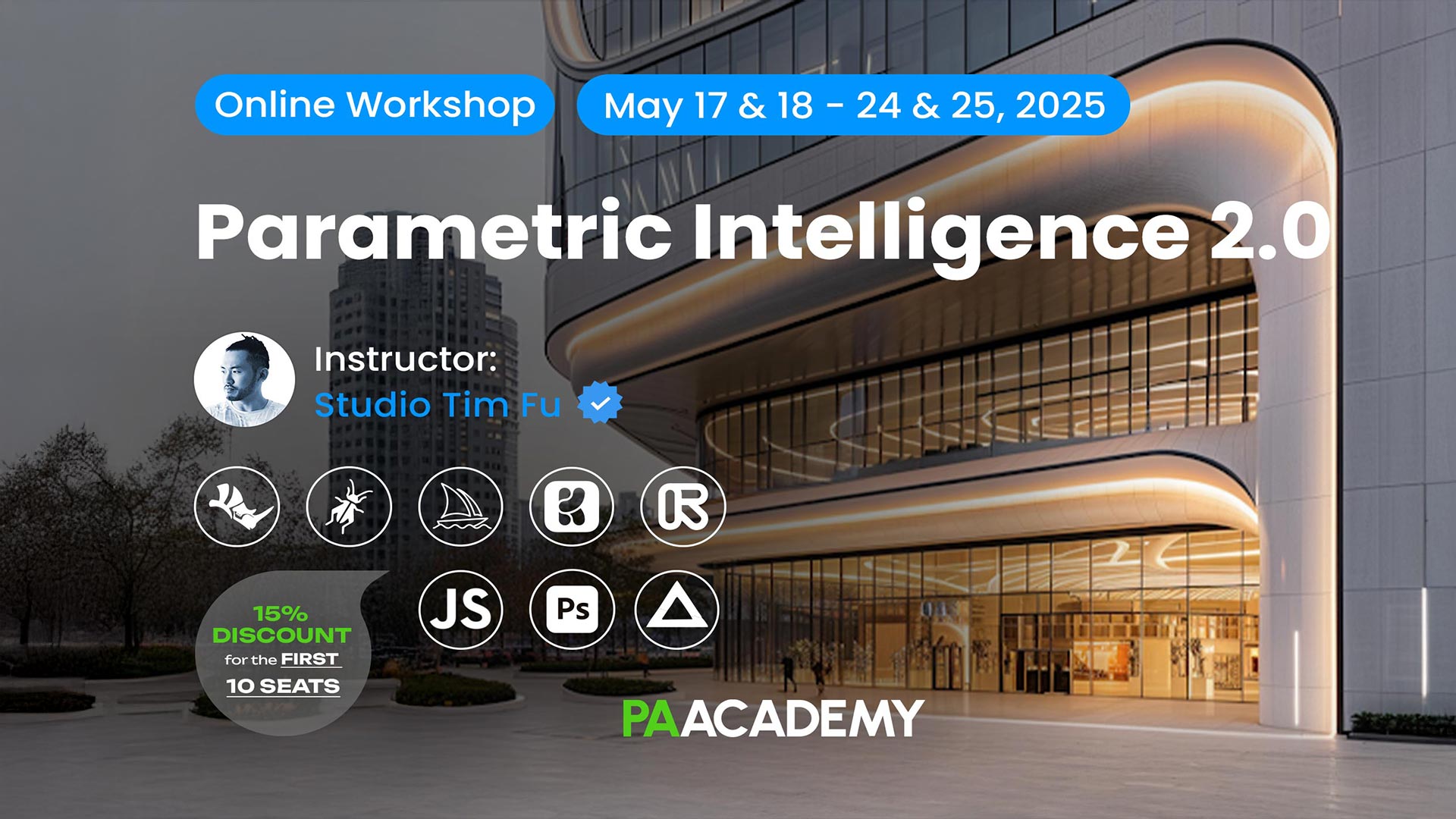Topic: Architectural Follies
Time: 15 March – 8 April 2021
Location: ZOOM hosted by PA
Format: Online
Total Sessions: 8 Sessions
Total Hours: 32 Hours
Workshop Type: Online project-based studio
Registration Deadline: 10th March 2021
Seats Available: 30 Seats
Fee: €300 EURO
First 10 Seats: €250 EURO (15% Discount for the first 10 seats) (Closed)
Organized By: PAACADEMY
Studio: Studio Erick Carcamo
Tutor: Erick Carcamo
Course Introduction:
In this course of Architectural Follies, you will be designing a pavilion using the various computational design methods, morphological and geometrical strengthening techniques addressing building systems.
The purpose of this assignment is to introduce you to alternative ways in which the articulation of digital geometry, digital materiality, and human activities define a relationship between site, space, and program. This necessitates a logic between morphological, geometric, and material characteristics of the structure, program, and environmental performance. The notion of performance will be understood as the integrated task of producing form and structure.
This class intends to engage design strategies that would allow for the further manipulation of the building enclosure by assuming a thickened poche, one that will add a solid sense to the building mass. As a way of moving away from thin, continuous surfaces, we will investigate techniques that deal with structure, mass, volume, material, color, and animation.
Course Objectives:
This class will be organized into two combined parts: tutorials and theory lectures. By mixing the highly specific realm of software tutorials and the more expansive cultural framework, students will be asked to articulate their design processes in both manners, by achieving high expertise in the tools and by understanding the role of those tools within the culture of architecture at large.
In current times it is expected that contemporary architects have the highest degree of expertise in a large array of tools and technologies, there is no doubt that technology has revolutionized the way we design nowadays, but at the same time, students must engage both technology and theory in a way that coherent thinking goes through all design processes, instead of merely relying on rule-based systems that only follow steps instead of ideas.
- Objective 1: To investigate novel forms of tectonics by means of 3D computational design modeling.
- Objective 2: To expand on the notion of color beyond the metaphoric or banal.
- Objective 3: To develop advanced technical skills within contemporary software (Autodesk MAYA & RHINO).
- Objective 4: To understand the genealogy of an architectural problem.
What is folly:
The folly is an architectural form that grew out of well-manicured landscapes in 18th-century Europe.
Typically, follies were created primarily as forms of decoration, and often served no functional purpose. A lot of their designs were purely sculptural, or even out of place within their context; their scale and proportions were arbitrary. Yet despite classicizing and orientalizing themes, despite attempts to make these structures appear to be from “other” places or “other” realities, traditional vegetated follies were symptomatic of the time and place in which they were made. Many of these structures evoked architecture of the past, while many suggested could suggest timeless origins. Some could also be designed to appear as though miraculously preserved, others were built as ruins.
Ironically, these idiosyncratic structures have become referents for contemporary follies. Yet the role of follies has transformed along with the philosophies held by those who create them.
In this Design Studio, we will create a project taking on different approaches towards this folly legacy, with varying degrees of loyalty towards tradition. All will take inspiration from individual aesthetics within a garden or urban landscape, yet some projects may deny the possibility of a structure with purely a decorative role. Collectively, they will embrace the ability of architecture to create, so the discussions of beauty, grotesque, whimsy, and parametric can be placed in a contemporary architectural setting.
Important Notes:
- Studio Erick Carcamo by PAACADEMY will start on 15th March on Monday at 16:00 UTC and will continue each Monday and Thursday till the last session on 8th April.
- Start date: Monday, 15th March 2021
- End date: Thursday, 8th April 2021
- Total sessions: 8 Sessions
- Weekly schedule: Each Monday & Thursday
- Daily schedule: 16:00 – 20:00 UTC (4 hours each session)
- Each session and the entire studio will be recorded and videos will be available for participants just a day after the class.
- The studio has limited seats. Tickets are non-transferable & non-refundable. Please read before you purchase.
Tutor:
Erick Carcamo (SCI_Arc, GSAPP, Penn Design, Cal Poly LA Metro)
Principal and co-founder – As an educator and designer, Erick has been in pursuit of innovation and technology in the field of architectural thinking and teaching processes; his expertise, expanding his graduate thesis at GSAPP, is based on researching digital experimental techniques and strategic thinking for the manipulation of Form in design, which he uses these design abilities in the services of thoroughly generating spatial and organizational issues central to architecture. Born in El Salvador, Erick holds a master’s degree in Advanced Architectural Design from Columbia University, GSAPP, and a bachelor’s degree from The Southern California Institute of Architecture, SCI_Arc.
PA Talks 38 – Erick Carcamo
Watch Erick Carcamo talking about the studio and Architectural Follies
Topic: Architectural Follies
Time: 15 March – 8 April 2021
Location: ZOOM hosted by PA
Format: Online
Total Sessions: 8 Sessions
Total Hours: 32 Hours
Workshop Type: Online project based studio
Registration Deadline: 10th March 2021
Seats Available: 30 Seats
Fee: €300 EURO
First 10 Seats: €250 EURO (15% Discount for the first 10 seats) (Closed)
Organized By: PAACADEMY
Studio: Studio Erick Carcamo
Tutor: Erick Carcamo



















Hi, I would really like to take part in that, but won’t manage to attend most sessions live. Will it be a big downside, to only watch the recorded sessions?
Hi Jan. Thanks for your interest. No problem if you are not able to attend the class online, you can watch the videos which will be available a day after the class. We would suggest to develop your project alongside the class and whenever you have the time you would show it to Erick and get critics.
I have full Rhino access through my employer but not Maya. Will you provide a a free temporary license for Maya for the duration of the course?
You should be able to download the free trial version of Maya from the link below.
https://www.autodesk.com/products/maya/overview
Hi what software will we be using ? I only know rhino.
Hi John. Basically Maya will be taught during the studio but we will have Rhino classes as well. So if you know nothing with Maya, no worries you will learn it and you can also develop your project in Rhino if you are comfortable with that. Let us know if you have any questions.
Never mind I just saw it. Rhino and max
Hi, I’m close to finishing the second year of my architecture degree. I want to know if I could take this course without problems.
Why there should be any problem? This studio will be absolutely helpful for you to enter the computational and generative design worlds by learning these software and producing a project.
Hah 300 Euro, is such an elitist price for a workshop with little real world application. Perpetuating false hope of any tangible roi in the realworld with this, art for arts sake.
Hi everyone! I am very excited to discover this collaborative community and this workshop. I just tried to register, but my bank here in the USA froze the transaction (due to security protocols) and I cannot resolve / complete the purchase until my bank is open again on Monday. Thank you for this opportunity and I look forward to joining.
We have emailed you just a while ago. Let us know if you haven’t received it.
Thank you everything has worked out. I have a separate question about installing the software. I have a 13-inch 2015 MacBook Pro 3.1GHz Dual-core i7 with 16GB of memory. Do you recommend I install windows via Bootcamp and run a free trial of Maya Windows version, or use Maya Mac version? Looking forward to Monday!
Hi Ben. Good to hear that. My personal experience would say to install Windows via Bootcamp and then run Maya there. But if you’re comfortable of using mac systems so much, you can use it in Macintosh.
Does this course require much previous experience?
Thanks
There’s no need to have a previous experience in Maya or Rhino. The required techniques will be taught in the studio. However, if you have any previous knowledge it would help you to develop your project. Let us know if you have any questions.
Thank you for that as I am looking forward to the course!
Glad to see you joined. Looking forward to Monday!
Hi! I’d love to take the course but I don’t know AutoCAD (I studied architecture in the 1990s and left the profession to work in marketing). Should I learn AutoCAD before considering this class? (Note that I’ve been designing in Bricklink Studio – an AutoCAD like software using Lego bricks).
Hi Raymond, thanks for your interest. You don’t need to know any architectural software to join this Studio. As mentioned by Erick in yesterday’s interview (you can find the link below) he’s going to start teaching from the very basics and show skills inside Maya and Rhino to very advanced forms of creating geometries and developing ideas. This studio is specially for people like who have no previous knowledge about any software. Let us know if you have any questions.
Watch the interview from here: https://www.instagram.com/tv/CMXqNG8D8rd/?utm_source=ig_web_copy_link